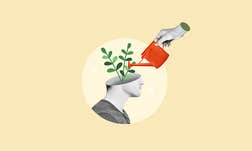In recent years the concept of panpsychism, “which entertains the possibility that all matter is imbued with consciousness,” writes Annaka Harris, has been firing up cognitive scientists who plumb the nature of consciousness. Some entertain the possibility with enthusiasm and some entertain the possibility with the enthusiasm of an archer eyeing a choice target. Nautilus has sparked the debate with articles by leading thinkers about panpsychism, which continues this week with two new essays, by, respectively, Harris and science writer George Musser, and a rerun of our most popular essay on the subject, in support of panpsychism, by Norwegian philosopher Hedda Hassel Mørch. To amplify the clash, here are three more perspectives from Nautilus articles and interviews.
AFFINITY WITH NATURE
Philip Goff, author of Galileo’s Error: Foundations for a New Science of Consciousness, philosopher and consciousness researcher at Durham University, United Kingdom:
While materialists and dualists believe that consciousness exists only within the brains of humans and other animals, panpsychists believe that consciousness pervades the universe, and is as basic as mass and charge. If panpsychism is true, the rainforest is teeming with consciousness. As conscious entities, trees have value in their own right: Chopping one down becomes an action of immediate moral significance. On the panpsychist worldview, humans have a deep affinity with the natural world: We are conscious creatures embedded in a world of consciousness.
This view is much misunderstood. Drawing on the literal meaning of the term—“pan”=everything, “psyche”=mind—it is commonly supposed that panpsychists believe that all kinds of inanimate objects have rich conscious lives: that your socks, for example, may be currently going through a troubling period of existential angst.
We are conscious creatures embedded in a world of consciousness.
This way of understanding panpsychism is wrong. Panpsychists tend not to think that literally everything is conscious. They believe that the fundamental constituents of the physical world are conscious, but they need not believe that every random arrangement of those particles results in a conscious subject. Most panpsychists will deny that your socks are conscious, while asserting that they are ultimately composed of things that are conscious.
Perhaps more importantly, panpsychists do not believe that consciousness like ours is everywhere. The complex thoughts and emotions enjoyed by human beings are the result of millions of years of evolution by natural selection, and it is clear that nothing of this kind is had by individual particles. If electrons have experience, then it is of some unimaginably simple form.
In human beings, consciousness is a sophisticated thing, involving subtle and complex emotions, thoughts, and sensory experiences. But there seems nothing incoherent with the idea that consciousness might exist in very simple forms. We have good reason to think that the conscious experience of a horse is much less complex than that of a human being, and the experiences of a chicken less complex than those of a horse. As organisms become simpler perhaps at some point the light of consciousness suddenly switches off, with simpler organisms having no experience at all. But it is also possible that the light of consciousness never switches off entirely, but rather fades as organic complexity reduces, through flies, insects, plants, amoeba, and bacteria. For the panpsychist, this fading-while-never-turning-off continuum further extends into inorganic matter, with fundamental physical entities—perhaps electrons and quarks—possessing extremely rudimentary forms of consciousness, to reflect their extremely simple nature.
The main attraction of panpsychism is not its ability to account for the data of observation, but its ability to account for the reality of consciousness. We know that consciousness is real and so we have to account for it somehow. If a general theory of reality has no place for consciousness, then that theory cannot be true. What panpsychism offers us is a way of integrating consciousness into our scientific picture of the world, a way that avoids the deep problems associated with dualism on the one hand and materialism on the other. I also think it offers a picture of reality more consonant with our mental and spiritual health.
INTEGRATED INFORMATION THEORY
Christof Koch, chief scientist and president, Allen Institute for Brain Science:
There are different versions of panpsychism depending on which philosophical or religious tradition you follow, but basically ancient or philosophical panpsychism meant that everything is ensouled. Now, I don’t believe that a stone is ensouled or a planet is ensouled. But if you take a more conceptual approach to consciousness, the evidence suggests there are many more systems that have consciousness—possibly all animals, all unicellular bacteria, and at some level maybe even individual cells have an autonomous existence. We might be surrounded by consciousness everywhere and find it in places where we don’t expect it because our intuition says we’ll only see it in people and maybe monkeys and also dogs and cats. But we know our intuition is fallible, which is why we need science to tell us what the actual state of the universe is.
Our universe has complexity and a system that gives rise to consciousness.
Panpsychism can be terribly elegant in its simplicity. You don’t say consciousness only exists if you have more than 42 neurons or 2 billion neurons or whatever. Instead, the system is conscious if there’s a certain type of complexity. And we live in a universe where certain systems have consciousness. It’s inherent in the design of the universe. Why is that so? I don’t know. Why does the universe follow the laws of quantum mechanics? I don’t know. Can I imagine a universe where the laws of quantum mechanics don’t hold? Yes, but I don’t happen to live in such a universe, so I believe our universe has certain types of complexity and a system that gives rise to consciousness. Suddenly the world is populated by entities that have conscious awareness, and that one simple principle leads to a number of very counterintuitive predictions that can, in principle, be verified.
What makes systems conscious? Are there any systems that are not conscious? Panpsychism doesn’t answer these questions. But Integrated Information Theory does. It makes some very specific predictions. It says, for instance, all complex neurobiological systems—all creatures that have brains—may well have consciousness, including bees and worms and octopi. It may also be possible that if you build a brain out of wires and transistors, that you find consciousness there, too.
Integrated Information Theory makes a number of very precise predictions that philosophical panpsychism was never able to make, so it’s a much richer, more quantitative, more scientific form of panpsychism. It has an informational structure that measures quantity, so you can now make some very precise statements about consciousness. While I don’t think Integrated Information Theory is the final word on consciousness, it’s certainly a big step in the right direction. It’s the sort of theory that will take us in the direction where we can turn metaphysics into physics, into a scientific subject. It will ultimately explain this most mysterious of all phenomena—how does subjectivity, how do feelings, how does experience, get into the physical world?
METAPHYSICS, NOT SCIENCE
Massimo Pigliucci, professor of philosophy, CUNY-City College:
Panpsychism doesn’t make any contact with the empirical world. My specialty is philosophy of science and so I tend to be sensitive to the difference between metaphysics and science, and whenever an account or theory makes no empirical predictions, and there is no way to test it, at least no foreseeable way to test it, then to me that’s just not science, it’s a metaphysical construct.
Now that’s perfectly legitimate. That’s what metaphysicians do all the time, but to me falls pretty squarely outside of science. And that brings up a broader problem. We are experiencing a period where fundamental physics is really playing close to metaphysics. I’ve been involved as a professional philosopher of science in discussions about string theory and other aspects of modern fundamental physics. A number of physicists are accusing some of their colleagues of engaging in metaphysical speculation rather than science because they keep pushing a theory that has not made any contact with the empirical world, and nobody knows how that contact might work out or when.
I don’t see any reason to think that inert things are conscious.
But there is a difference between panpsychism and string theory. String theory is built on top of quantum mechanics, which is a very empirically based, supported theory. Panpsychism on the other hand is not rooted in anything. It’s just a way to solve what some philosophers of mind call the hard problem of consciousness—the question of how is it possible that a lump of matter like the brain makes it possible for people to have first-person experiences or conscious experiences. Postulating that consciousness is another mental property of the universe is one way to get around that. But I don’t think it actually solves anything. It just replaces one mystery with another.
Some people think that consciousness is made possible by the way in which the brain processes information, which implies that it is about not what the brain is made of but how the brain is structured, which means that you could, in theory at least, replicate the whole thing by replicating the structures without having to replicate the actual substance. You could have presumably artificial systems that are not made of biological materials that will be conscious simply because they have the right structure.
I don’t find that convincing at all. I come at consciousness from a point of view of a biologist. To me, consciousness is a highly evolved property of certain biological systems and it does require not only a certain structure, but certain materials. I don’t think that if you could build, for instance, an exact replica of the human brain made out of cardboard, you would have a conscious thing out there, probably not even made of very much more interesting materials like silicon. The reason for that is because biological consciousness, the little we know about it, is made possible by not only certain structures in the brain but also certain chemicals and certain chemical reactions and certain interactions between chemicals.
Consciousness probably evolved for specific reasons because, after all, it costs a lot metabolically to maintain the kind of brain that can engage in conscious thoughts. There must be a reason and it must be advantageous from the point of view of natural selection. I don’t see any reason to think that inert things are conscious. I don’t even see a particular reason to think that a lot of other biological things, like plants, bacteria, things like that, are conscious. But that’s just one perspective and one way to look at it.
Kevin Berger is the editor of Nautilus. Brian Gallagher is the editor of Facts So Romantic, the Nautilus blog. Follow him on Twitter @BSGallagher.
Lead image: Lightspring / Shutterstock


























